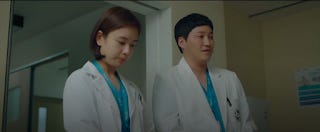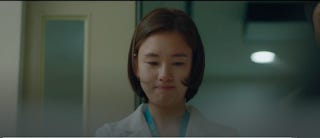Hospital Playlist Retrospective Season 1 Episode 8
Please be aware that this post contains all kinds of spoilers for the entire drama not just the episode under discussion.
Episode 8 is a powerful episode that contains pivotal moments for the doctor who was formerly a bachelor and the aspiring priestly aspirant who perhaps for the first time in his life is seriously being challenged about some fundamental home truths about himself. Although he seems to be on track for the priesthood, questions from various quarters are raised over whether the priesthood should be his goal. While both these men have to wrestle with the unpredictable aspects of life that touch them, there is a bigger picture to consider.
Both men are being pressed to rethink their future and their responsibilities to the people around them. In the case of Jun-wan, he has been pressed to take the job of the CS chief, a prestigious position undoubtedly for a man his age but he doesn't want it. As Director Ju notes, no one wants it despite an increase in pay and the status because the younger doctors know that the status comes with increased responsibilities for the sitting in the position. More responsibilities means more pressure on work and life balance. With Jeong-won he is compelled to rethink his position on the priesthood, not just by his aggrieved mother but also in his undeniable attraction to Gyeo-ul. His lie to her about visiting his mother on the weekend is rather symptomatic of the internal tug-of-war that is being waged. The lie is never about him disliking her. Otherwise the show would never gone to the trouble of emphasizing that he routinely went out with women from the hospital without a second thought. He's not construed as a serial dater. He's not a Jun-wan. Or at least what Jun-wan used to be. Going out with women from to dinner or the movies when asked are purely social interactions. But when Gyeo-ul opens her mouth to ask for a dinner date... he lies about having plans for the weekend.
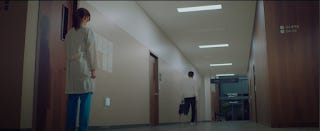
So Ahn Jeong-won breaks the pattern this time. It's a soft "no" but a "no" nonetheless. What should we make of it? To me it suggests some measure of indecision. If Jang Gyeo-ul isn't a threat, why make such a big deal of it by lying. If she doesn't mean anything to him, what's the problem of going to have dinner with her? What is Ahn Jeong-won afraid of?
I submit that there could be a number of reasons. He can see that Gyeo-ul is in earnest and he doesn't want her to get hurt. But then what about the other women, like Bae Jun-hui who seemed to be in earnest too and was pretty chuffed by his positive responses until Hui-su clarified things with her. Why didn't he care that he would give the wrong impression and hurt her? It could be he doesn't like her but why lie then? Why doesn't he tell her or any other woman that he doesn't date because he's headed for the priesthood? The lying is interesting because it means a possible lack of conviction. For me it demonstrates a hesitation. An escapist tactic. It's an issue he would rather not have to deal with now. Or ever.
The only logical explanation is that she poses some serious, real danger to his current trajectory. The temptation is actually real. If he goes out with her, he will cross a line he doesn't think he can come back from. That's why I think the scene outside the emergency exit is so key here. I believe that it is the first time he is seriously challenged to think through the ramifications of his choice to enter the priesthood which he might not have previously. Can he in all honesty enter the priesthood when he is already so emotionally compromised? Can he be dispassionately standby and watch her get into another man's car with any kind of regret? Can he really let her go that easily? Judging from this scene, I don't think he can.
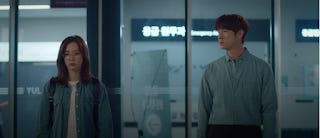
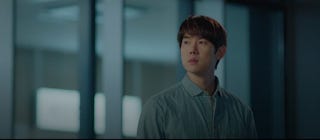
As someone who has defended the Winter-Garden dynamic for a long time, I am obviously baffled by comments questioning Jeong-won's decision to "give up his dream" of the priesthood for love. Not only is that something of an exaggeration but the statement assumes all the wrong things about the priesthood that I've delineated elsewhere. The priesthood is not a job or a career opportunity or something to cross off on one's bucket list. It's much much more than that. It also rather inconveniently requires total devotion to celibacy. There is a reason why the vast majority of people in Catholicism aren't priests because celibacy isn't the norm. So the right question should be... how can a man who has fallen in love with a woman believe, in all honesty, that he can even devote himself to lifetime celibacy. If she rattles him that much, maybe the right thing to do is re-evaluate the original idea in the first place. Perhaps the wish or the dream... is just that... and not a realistic possibility.
Before encountering Gyeo-ul at the ER entrance, he is negotiating with his parish priest about when he should have his interview. Before he rings off, he assures the priest that he will persuade his mother to accept his decision. Not long after this, he sees Gyeo-ul in the pickup zone waiting for her ride. I find this scene instructive. It is a chance encounter unlike the one at the start of the episode and yet unbeknownst to either they meet. It is awkward as Jeong-won is careful not to give the impression that he's more curious than he should be. He feigns indifference but his question about who she's going out with suggests otherwise.
Increasingly it's become difficult for Jeong-won to compartmentalize Gyeo-ul and that feeds into the idea that their romance is based around work. For them there is no personal-professional delineation even if he doesn't realise it yet. For them, that line is gradually becoming more and more fuzzy as he falls further still. They can't avoid each other forever and while the personal stuff can't be untangled immediately, the work stuff has to be taken care of in the immediate future. Lying to her is at best a band-aid solution to a deep heart issue. It is an impromptu avoidance strategy that sweeps the issues under the carpet. Not only does he hurt her, he hurts himself in the process.
When he wistfully stares after the vehicle that she gets into, it must dawn on him that this is the kind of heartache that he is on the road to. Regret is the name of this game. The person who has the most to lose ultimately is him not her if (as he suspects) she has moved on. Can he stand around and be a bystander as she finds her happiness elsewhere?
So why do I obsess over Jun-wan and Jeong-won's seemingly antithetical tracks? Because ultimately I don't think that the larger narrative just about them angsting through personal issues. It's clear that ultimately this is about the long-term survival and viability of the hospital. It's not much of a leap to speculate that some time in the future, one or more of the five will end up running the hospital in some capacity because whatever flaws they have as individuals, they are committed to the highest ideals of best practice and patient-centred care. At this point in time Jeong-won's still determined to see through his plans to enter the priesthood despite hints everywhere that he probably shouldn't.

The present chairman and director seem to be leading the way admirably but it's clear with ominous talk of Jong-su's health issues that these two men aren't not going to be around forever. Ageing and all that it brings is a reality and the succession issue must be at the forefront in any kind of long-term planning for the hospital's future. People are the lifeblood of the hospital. Upstairs and downstairs.
Because of where he's at, Jun-wan's love line looks very different from Jeong-won's. Jun-wan has embraced that aspect of his life with complete abandon as that relationship has seen consummation. Moreover at the end of the episode, he finds himself reluctantly taking up the role of CS chief because he comes to the realisation that he not someone who can sit at the sidelines and watch things unfold. The thought that someone like Professor Cheon could be calling the shots must be a terrifying one. A man like that should never be allowed to be chief. He doesn't care about the patients and he abuses his privileges. The fallout from Jae-hak going on a tirade with a patient's daughter must have also been a consideration his final decision. Jun-wan knows only too well that the person who sits in the chief's chair is taking on a weighty role that affects the well-being not only of the patients but of those working in that department. Good and bad outcomes hinge on what decisions is made from that position.

This is what adults do... they face up to the realities in front of them and deal with them straight on. Adults also do hard things by dealing with the unpleasant side of their jobs. Jun-wan has to give parents the bad news about their baby boy. Then it becomes his job to go and ask them to donate their little boy's heart. Later he attends the baby's funeral and comforts a grieving mother. Even thought he's not religious Jun-wan is running to face every facet of his "calling" head on, while Jeong-won is running away from his issues by spending his time in the PICU and using the priesthood as a cover. It's not surprising he has headaches because the struggle is real. It won't be resolved by running to the priesthood, lying to or hiding from the woman who might be the messenger/angel that God is sending to him.
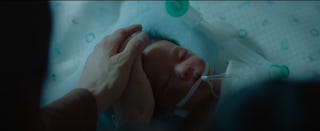
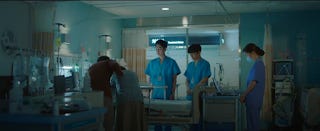
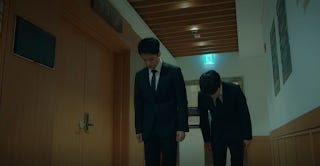
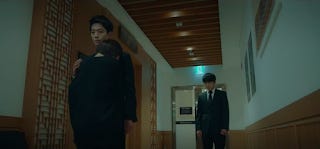
The theme of taking responsibility runs right through the episode. That certainly came to the fore in "Min-ha's having a bad day" storyline. She was having a hard time because she showed herself responsible particularly in contrast to her colleague, Myung Eun-won who is perpetually scheming to make things easy for herself. There's no doubt that working smart has its place but in any occupation or situation, there is no getting out of putting in the hard yards.
